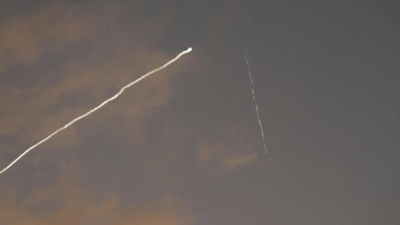
How China stands to gain from US strikes on Iran (Image: AP)
The Israel-Iran war escalated rapidly following the United States' bombing of Iranian nuclear sites over the weekend, a move China framed as a blow to Washington's global reputation.On Tuesday, just hours after US President Donald Trump announced the beginning of a "complete and total ceasefire" between Israel and Iran, the Israel Defence Forces (IDF) said missiles had been launched from Iran toward Israel.Israeli Defence Minister Israel Katz said he had instructed the IDF to "respond with force" to the missile launch.The Israeli army said one or two missiles launched from Iran toward the north of Israel had been intercepted.
However, Iran's armed forces denied any missile launch toward Israel in recent hours, according to local media in Iran.Trump's ceasefire plans followed US strikes on Iran's key nuclear enrichment sites over the weekend. In response, Tehran on Monday targeted a US military base in Qatar, a key regional hub for American forces.China has not immediately commented on the latest developments.On Sunday, its Foreign Ministry spokesperson, Guo Jiakun, criticized the US attack on Iran as a serious violation of the United Nations Charter, the founding UN treaty that largely prohibits the use of force between countries except in self-defence or with the approval of the UN Security Council.
Guo said Beijing was "ready to work with the international community for restoring peace and stability in the Middle East," without providing specific details.The rhetoric echoed earlier criticism from China's UN Ambassador Fu Cong, who said US credibility had been "damaged" both as a country and as a participant in any international negotiations.
What is at stake for Beijing?
China's call for stability in the Middle East comes amid economic concerns Iran could close off the Strait of Hormuz, which would destabilize oil prices worldwide.The narrow waterway between Oman and Iran that connects the Persian Gulf with the Gulf of Oman and the Arabian Sea is a critical gateway for oil transport.Washington has previously urged China — Iran's largest trading partner and primary oil export market — to dissuade Tehran from blocking the key waterway."An increase in the oil and gas prices would, of course, put pressure on [China's] economy. It would make inflation worse," said Ja Ian Chong, a political scientist at the National University of Singapore."Beijing certainly has reason to make sure that escalation doesn't get out of control. But whether it's able to fully restrain Iran is a different story altogether," he added.China is Iran's key economic backer, especially amid Western sanctions and Tehran's growing international isolation stemming from its nuclear program and human rights record.Iran is a significant partner in China's Belt and Road Initiative, a massive infrastructure plan that aims to connect Chinese trade and influence across dozens of countries."With a weakened Iran, one that's perhaps militarily bordering on either full-on conventional war or civil war as a result of US military intervention, it's going to make Iran a lot less effective partner for China's outreach in the Middle East," said Wen-Ti Sung, a non resident fellow with the Atlantic Council's Global China Hub.
China's chance to gain diplomatic capital
Sung told DW that China is likely to earn more diplomatic goodwill in the wake of the US military attack on Iran's nuclear sites."So long as the potential for further future military strikes from the US is not off the table, the diplomatic effect will be the same," he said.China has long portrayed the US as a destabilizing force, while framing itself as a responsible advocate for peace and stability."[China] will now have more ability to talk about the US being a disruptive actor, being a potential threat. They have been especially active in pushing this narrative in the global south," said Chong.In 2023, China brokered a landmark agreement between Saudi Arabia and Iran to restore diplomatic relations after seven years of severed ties — a move Beijing portrayed as a major diplomatic success.But in the current crisis, Beijing's backing of Tehran has remained mostly rhetorical, with no indications of it playing a similar mediation role."Beijing is influential, but just like the US cannot control Israel, Beijing cannot [restrain Iran]," Chong said.
Beijing could benefit if Washington shifts focus from Asia
Meanwhile, a US that is devoting less attention and resources to the Indo-Pacific region could potentially relieve international pressure on China over its growing military presence in Asia.Earlier this month, a US aircraft carrier originally scheduled to arrive at a port in Vietnam was rerouted and headed toward the Middle East due to an "emergent operational requirement," the US Embassy in Hanoi said."That port visit was supposed to show the US commitment to security and stability in Asia.
Now, that shifts away," Chong said."If there's going to be a prolonged drain on US attention toward the Middle East, Beijing may recalculate [its strategy]," Chong said, referring to China's approach toward Taiwan, a self-ruled island Beijing claims as its own. Beijing has not ruled out the possibility of using force to achieve "reunification."With the US now deeply entangled in the Middle East, its regional allies including Japan, South Korea, the Philippines and Australia "will have to do more themselves and also work harder with each other," Chong said.At this stage it's unclear whether the US strike on Iran is an isolated incident before Washington refocuses on Asia, or if it signals a broader pivot toward prioritizing the Middle East.

 3 weeks ago
14
3 weeks ago
14










 English (US) ·
English (US) ·